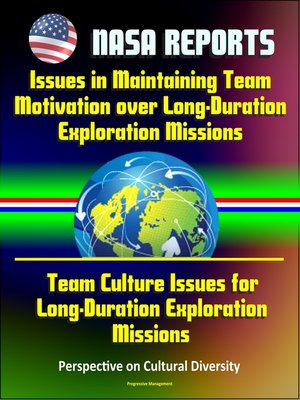NASA Reports
ebook ∣ Issues in Maintaining Team Motivation over Long-Duration Exploration Missions, Team Culture Issues for Long-Duration Exploration Missions--Perspective on Cultural Diversity
By Progressive Management

Sign up to save your library
With an OverDrive account, you can save your favorite libraries for at-a-glance information about availability. Find out more about OverDrive accounts.
Find this title in Libby, the library reading app by OverDrive.



Search for a digital library with this title
Title found at these libraries:
| Loading... |
These two excellent NASA report have been professionally converted for accurate flowing-text e-book format reproduction.
Issues in Maintaining Team Motivation over Long-Duration Exploration Missions: This review was commissioned by the Behavioral Health and Performance Research Element (BHP-R) of the NASA Human Research Program (HRP) in order to review the issues that might arise in maintaining team (crew) motivation over long durations. The team and spaceflight research literatures were reviewed and ten interviews were conducted with a variety of spaceflight experts. These experts had considerable experience (27 years on average) in a variety of spaceflight domains, including mission planning, flight operations, astronaut selection and evaluation, and high fidelity analogous missions and environments. Five distinctive crew motivational challenges (CMCs) were identified in the interviews and the literature review was organized around these challenges.
Team Culture Issues for Long-Duration Exploration Missions: This review was commissioned by the Behavioral Health and Performance Research Element (BHP-R) of the NASA Human Research Program (HRP) in order to review the issues that might arise in maintaining team (crew) motivation over long durations. The team and spaceflight literatures were reviewed and ten interviews were conducted with a variety of spaceflight experts. This review is organized by the five distinctive crew motivational challenges (CMCs) that were identified in the interviews, including (1) the presence of motivational challenges, (2) mission preparation, (3) crew autonomy, (4) workload, and (5) team composition and individual differences.
Issues in Maintaining Team Motivation over Long-Duration Exploration Missions * Executive Summary * Operational Recommendations * Research Recommendations * Background * Understanding Team Motivation * Expert Interviews * Literature Review * Crew Motivational Challenge #1: * Presence of Motivational Challenges * Expert Interview Results. * Literature Review Results * Potential Solutions * Crew Motivational Challenge #2: * Mission Preparation * Expert Interview Results * Literature Review Results * Potential Solutions * Crew Motivational Challenge #3: * Crew Autonomy * Expert Interview Results * Literature Review Results * Potential Solutions * Crew Motivational Challenge #4: * Workload * Expert Interview Results * Literature Review Results * Potential Solutions * Crew Motivational Challenge #5: * Team Composition and Individual Differences * Expert Interview Results * Literature Review Results * Potential Solutions * Summary and Suggestions for Future Research * References
Team Culture Issues for Long-Duration Exploration Missions * Section I: The Effect of Culture and Cultural Diversity on Crew in LDDEM: Insight from the Scientific Literature * Purpose * Methodology * The Impact of Culture on Team Outcomes * The Impact of Culture on Team Processes * Culture and Emergent Team States * The Importance of Context: Moderators * Conclusion * Section II: Strategies for Mitigating the Negative Effect of Cultural Diversity, Moving Towards a Synergistic Perspective: Insight from the Scientific Literature * Purpose * Methodology * Cultural Training * Conclusion * Section III: An Operational Perspective on Cultural Diversity in LDDEM Crews * Purpose * Methodology * What Was Uncovered with Respect to Cultural Differences? * Looking Forward * Mitigation Strategies * Conclusion * Section IV: Gaps and Recommendations * Recommendations for Practice. * Recommendations for Research * References






